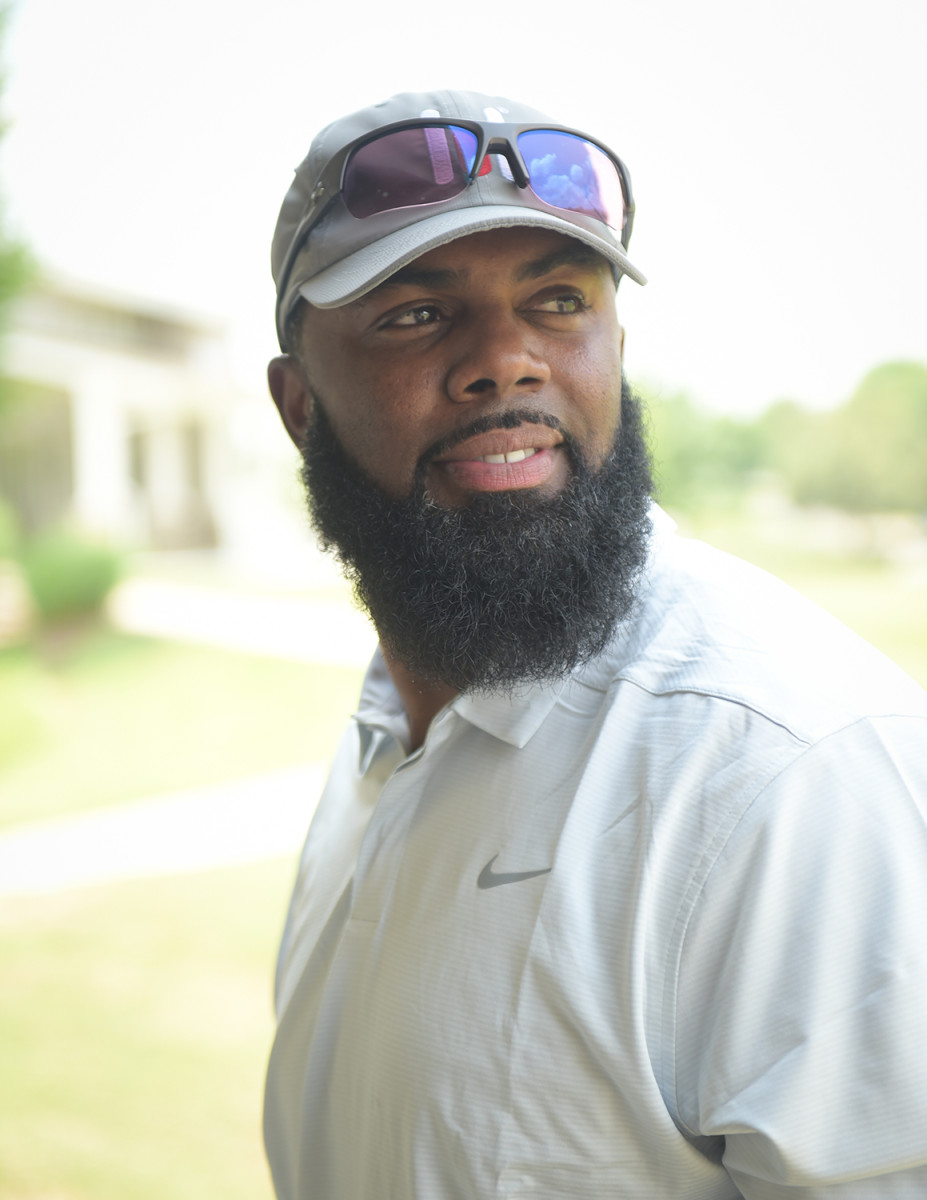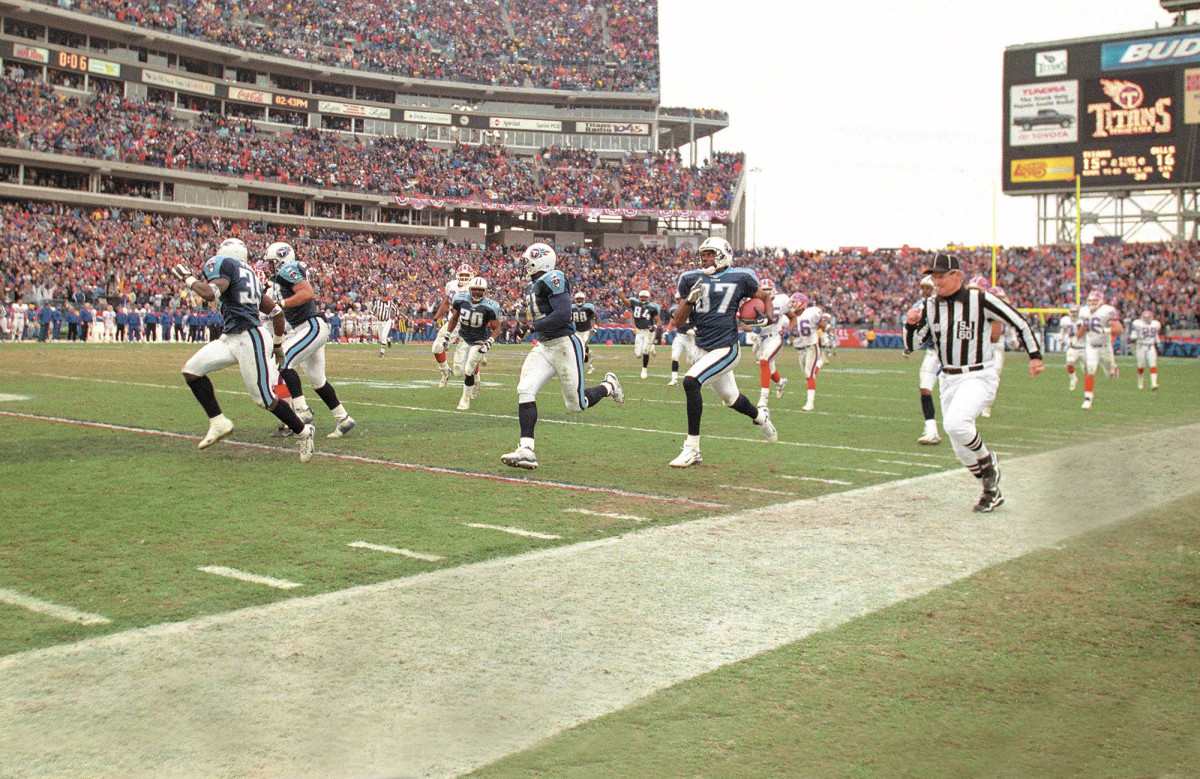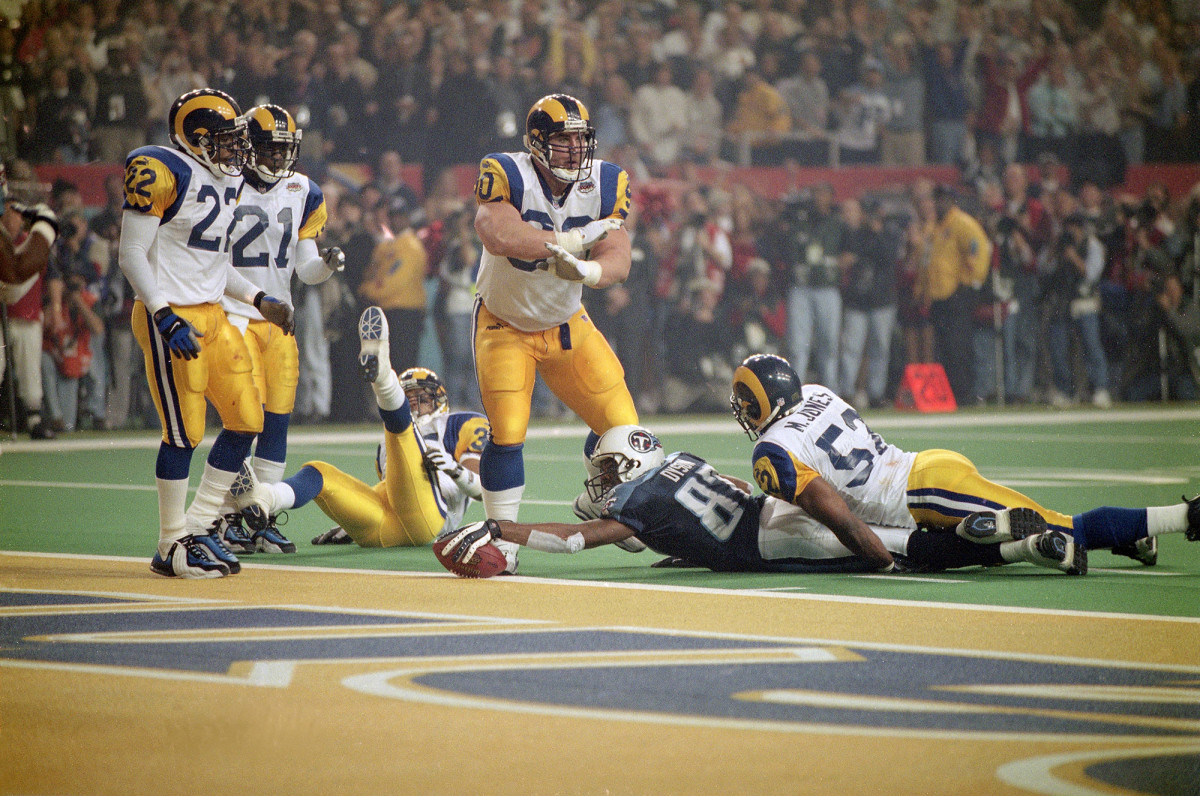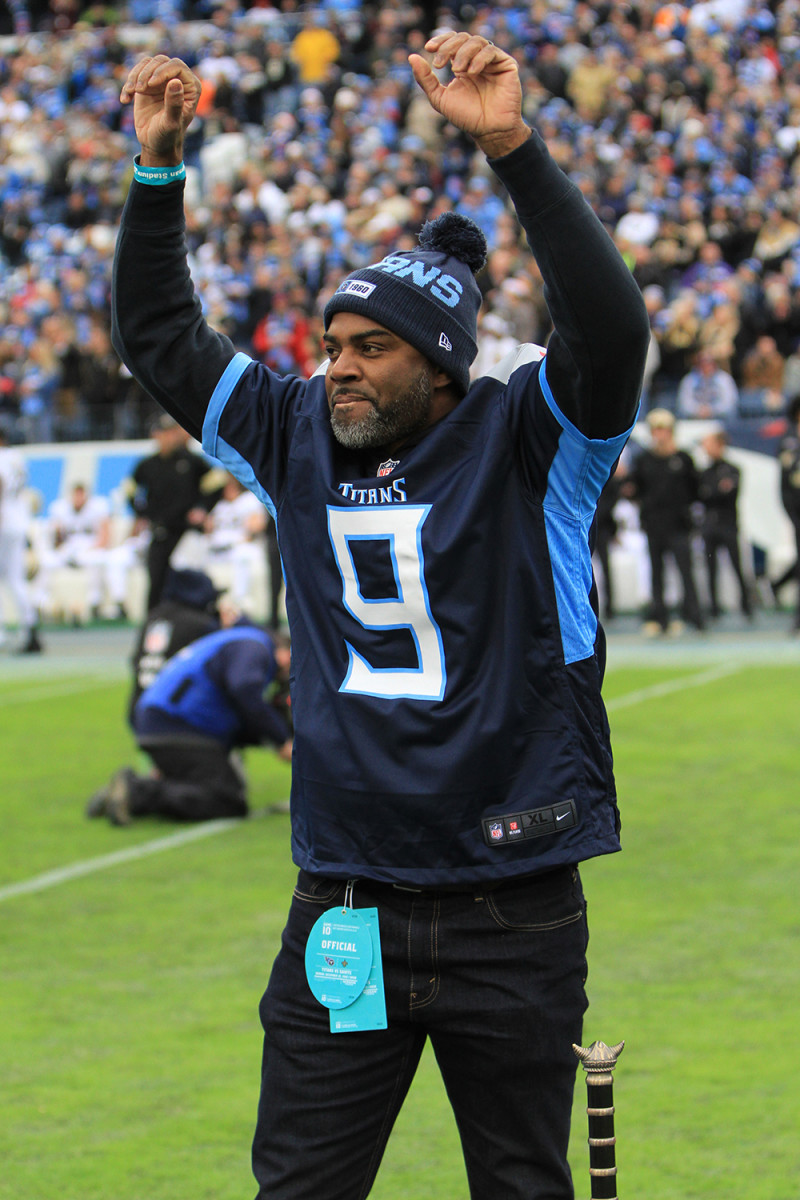Titans Legend Kevin Dyson Embraces New Challenge As a Middle School Principal
Half an hour outside Nashville, the principal of public Grassland Middle School turns heads for his stylish getup. Some days he roams the grounds rocking a bow tie, other days a blazer but no tie at all. He dons cardigans and Converses, vests and Vans, each ensemble accented by a dark scholarly beard that looks dusted with powdered sugar. A stodgier, stiffer breed of his profession might settle for a rotating five-day wardrobe of ill-fitting, drab suits. Not him.
“The kids seem to notice how I dress,” says Kevin Dyson, 45. “So, you know, I’ll mix it up.”
On this late-October morning, however, the former Titans wideout—best known for starring in two all-time famous NFL plays, both in the 1999–00 playoffs, only one of which went in his team’s favor—is just another casually clad telecommuter, wearing a ballcap and hoodie while talking on Zoom from his basement. Class is in session at Grassland, but Dyson is staying home with his two young children, who are self-isolating after coming in contact with a close relative later learned to be COVID-19 positive. So it goes as an educator and a parent in a pandemic.
“It’s the up and down,” Dyson says. “One week is very good, very quiet, then the next you have kids being quarantined.”

Fortunately son Genesis (age nine) and daughter Korynne (seven) appear to be out of the woods, having already tested negative. At Grassland, meanwhile, strict safety measures have helped keep case counts relatively low among 1,000-plus students and faculty: Everyone wears masks inside, no one drinks from water fountains, temperatures are checked at the entrance and foot traffic is directed down one-way halls lined with arrows. But Dyson knows better than to let his guard down, as infection rates in Tennessee soar and the state death toll ticks toward 3,500.
“It’s unfair to students, to parents, to teachers and even administrators, because we’re all somewhat held captive by the virus,” he says. “We can’t be normal right now.”
Even in normal times, the zig route where life has brought Dyson would’ve baffled his former self. This is his second year as head principal, hired by Grassland from an area public high school in May 2019, and his 16th in education altogether, more than twice as long as he spent at football’s highest level. Sure, no shortage of former players have headed back to school after hanging up their cleats, whether as teachers, coaches or athletic administrators.
But this?
“If you’d have told me that I’d have two master’s and a doctorate, and that I’d be a principal,” Dyson says, “I would’ve thought you were crazy.”
***
Based on his stats alone, Dyson had a fine, if forgettable, pro career. A first-round pick out of Utah in 1998, he lined up for 59 games over five-plus seasons, almost exclusively with the Titans, catching 178 passes for 2,325 yards and 18 touchdowns. “I was a role player,” he says, but then again how many “role players” can claim such a singular role in NFL history?
Consider: Last year, in honor of the league’s centennial anniversary, fans participated in a vote for the “greatest moments” of all 32 teams. The results are compiled on NFL.com, accompanied by pictures capturing the triumph of Philly Special, Elway’s Helicopter Run, and others. Suffice to say, Dyson is the only player who appears twice. There he is in the Titans’ slot, chugging down the sideline to beat Buffalo with the Music City Miracle kickoff return in January 2000. And there he is less than a month later, upside down and lunging toward the goal line with the ball in his right hand, brought down by The Tackle that delivered Super Bowl XXXIV to the Rams.
Every athlete deals with highs and lows. For Dyson, these extremes define his legacy. Sitting in his basement, a framed No. 87 Titans jersey hanging on a nearby wall, he is asked how he reflects on that three-week span and the impact it has on how people remember him. “To have plays that are still talked about, to be somewhat relevant 20 years later, I’m very appreciative,” Dyson says. “That’s how I’ve contextualized the whole thing: something to show from my time in the National Football League. If not, we probably wouldn’t be having this conversation.”
After one final game with the Panthers during the ’03 season, Dyson bopped around practice squads and battled injuries until quietly retiring in ’06. From there, he says, “I knew I wanted to be around the game, and of course naturally that’s coaching.” He envisioned returning to the college or pro ranks, or otherwise becoming a high school athletic director. That was the plan.
For a time Dyson stayed on track. He coached and taught gym at Franklin Road Academy, a private Nashville-area Christian school. He guided the wide receivers and defensive backs at public Glencliff High, then spent four seasons on the Independence High football staff, including three as head coach. By late 2012, though, he was feeling burned out.“I thought I’d be good at it,” he says. “But it didn’t work out.” Fortuitously enough, not long after suffering a lopsided playoff loss around Election Day, Dyson got a call asking whether he was interested in becoming an assistant principal at Stewarts Creek, a brand-new high school in an adjacent county. “I said, ‘Well, let me take on a new challenge,’” he says. “And I grew to love it.”

A sociology major with a criminology concentration at Utah, Dyson had long since added two master’s degrees to his résumé—education administration in 2007 and secondary education in 2009, both from Nashville’s Trevecca Nazarene University—when he decided to also pursue a doctorate in education in 2015, having heard about an NFL program that provided academic financial aid to ex-players.
As when he hauled in tight end Frank Wycheck’s cross-field lateral and huffed 75 yards to score against the Bills, completing the two-year educational program at Trevecca Nazarene ranks near the top of his “greatest personal achievements,” he says. The culmination came at a nerve-wracking dissertation defense, on an online literacy program for local ninth-graders, which brought Dyson back to his playing days. “It was a different type of Super Bowl for me,” he says.
Dyson sees other parallels between football and his new career. “A coach is judged on that performance of their players, even though they don’t pick up a ball,” he says. “Same thing as a principal, an educator: We’re all judged on how we perform in those games. And those games are state assessment tests.” But there are obvious major differences, too. As an NFL player, Dyson says, “My responsibility was me. I had to make sure I was eating right, going to bed, studying film, helping my team win. I’m trying to be the best version of myself so I can make a big contract. Well, being in this seat, you’re taking care of other people's kids.”
If anything has surprised Dyson in six years as an assistant principal and one-plus more in the big chair, it’s the number of hats that school administrators must wear on a daily basis. “You become an investigative detective, you become a therapist, you become a support system, you become a disciplinarian,” he says, and that was just before COVID-19. But the payoff is more than worth it. “I love the challenge,” he says. “It’s helped me grow as an individual. I didn’t have to do anything as taxing as this. I don’t know what else I could be doing that’d be as rewarding, either. When you see kids smiling, you see them learning, you see teachers coming to you saying, ‘I figured something out, I got this, this kid loved it,’ ultimately that’s what keeps you going.”
If he ever needs another reminder, though, Dyson can always just look at the quote embedded in his school email signature, below a thumbnail of Grassland’s logo:
“It is absolutely still possible to make a difference."
—Michelle Obama
At Grassland, where the oldest students were born a full two years after Dyson retired, his gridiron days don’t come up much. Some parents have been known to geek out upon meeting him, feverishly sharing stories about their ecstasy during the Music City Miracle, and their heartbreak when Rams linebacker Mike Jones brought down Dyson one yard shy of the end zone as time expired in the Georgia Dome. But the kids? “The kids are like, ‘No way, you’re just the principal, right?’ ” Dyson says. “Then when they find it out, they’re like, ‘Is that really you?’ ”

In fairness to today’s youth, Dyson doesn’t exactly advertise what he used to do for a living, either. But any classroom troublemakers dispatched to his Grassland office will find a couple of hints. One is a bobblehead of Dyson from a 2017 giveaway for Titans season-ticket holders, perched on his bookshelf. The other resides next to the candy dish. (He’s a principal. Of course he has a candy dish.) It is a printout of a meme created by one of the Grassland teachers, featuring a still shot of Dyson getting tackled by Jones at the one, forever short of the end zone.
“When you’re late for class,” it reads, “and you almost make it before the tardy bell.”
***
Like so many others in a country where more than 230,000 have died of COVID-19 to date, Dyson has also suffered deep loss during the pandemic. His came when his 65-year-old father, Cleavon (Steve) Dyson, died on July 14, after contracting the virus. “He had some heart stuff, and he got to the point where they had to put him on a ventilator,” Dyson says. “Nobody wants it to hit home in that kind of way.”
After flying to Las Vegas for the funeral, Dyson entered the home stretch of planning for the upcoming school year. (Along with all of Williamson County Schools, Grassland closed its doors on March 6 after the state’s first COVID-19 case was found in a local adult.) His days were filled with meeting after meeting, mostly on Zoom, mostly regarding safety protocol for when students would return to class. But that was hardly the only heavy topic on the principal’s mind.
At first, after the police killing of Minneapolis resident George Floyd, a fellow Black man in his mid-40s, Dyson felt conflicted about using his platform to speak out regarding social and racial justice. “As an educator, as a public figure, so often we have to stay in the middle,” he says. “I didn’t want to come off as being the angry Black guy, or whatever. That was the initial fear.” But after conversations with other educational leaders in Williamson County, an overwhelmingly white and wealthy region, he decided to send what he describes as a “heartfelt email” to parents of Grassland students laying out how the country’s racial reckoning was affecting him.
“My message was, it’s an emotional time for people, including myself, an African American father, having to have a conversation with his African American son about the circumstances of what’s going on as he’s watching his mother cry,” says Dyson (who couldn’t find a copy of the email but recounted its contents). “That’s ultimately why I decided to do it, to let them know who I am. I walk in that school every day, you see my difference. Your kids see it every day.
“It’s a conversation that should’ve been had hundreds of years ago. Here we are in 2020, and we’re still trying to have it. Are we going to change people's minds? I can’t go into the homes and change anyone’s mindset. But what I can control is how we respond to stuff in our building.”
Classes at Grassland resumed in early August, on time for the start of the ’20-21 school year, although students were online-only for three weeks before the majority finally returned to campus. (About 12% of its student body is continuing full-time virtual learning, Dyson says.) Since then, Dyson’s hands have been full with a daily crush of COVID-19-related issues. Sometimes it is nothing more annoying than having to remind a student to put their mask up after lunch. Other times, as Dyson says he had to do one day in early October, it involves mass-emailing nearly parents of 20 kids who were ordered into quarantine after contract tracing by the Williamson County Health Department revealed potential exposure to positive cases.

“It can be tough to navigate, but I think everybody's doing their best to adjust to it,” Dyson says. “But I also think we're all starting to get worn down a little bit and need a break. Thanksgiving and Christmas can't get here fast enough. … I’m like everyone else. I’m sick of 2020.”
Even so, he wouldn’t want to be anywhere else. He still gets his fill of football, helping coach his son’s youth team—Genesis is a wide receiver, naturally—and providing pregame and postgame analysis for Titans radio broadcasts. But the school is his locker room now, and every fellow educator is a teammate. “Just being able to go through this with your extended family, your teachers, your administrators, and figure out this plan to best serve kids, to best serve a community …” Dyson says, trailing off. “That’s what I’ve been pleased with.”
As the Zoom call winds down, with the school day well underway, Dyson’s basement is increasingly filled with the pings of incoming texts, emails and other pressing items of business demanding his attention. “Guess I need to go work,” the principal says, so he logs off and does.
